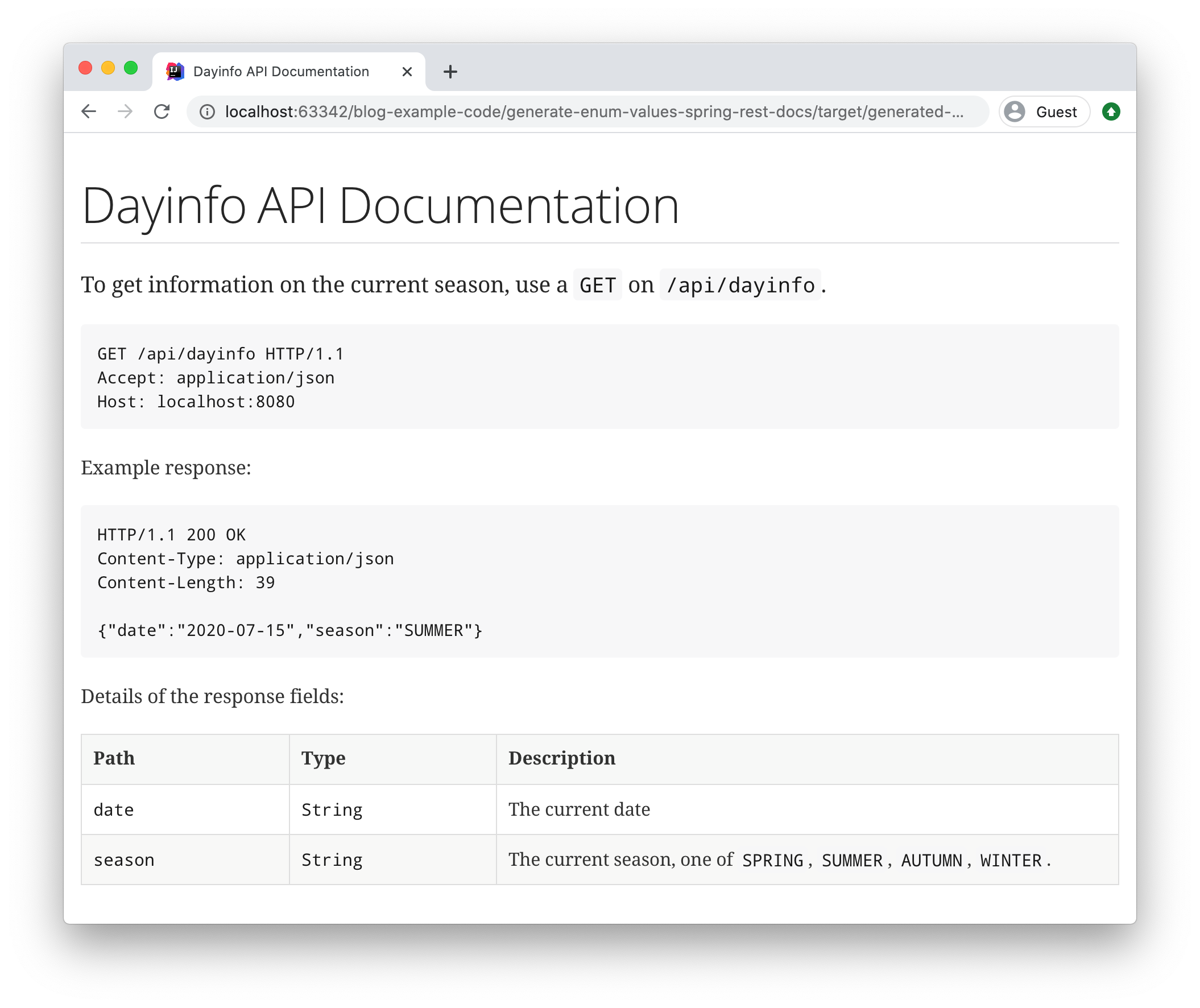import org.springframework.web.bind.annotation.GetMapping;
import org.springframework.web.bind.annotation.RequestMapping;
import org.springframework.web.bind.annotation.RestController;
import java.time.LocalDate;
@RestController
@RequestMapping("/api")
public class DayInfoRestController {
@GetMapping("/dayinfo")
public DayInfo getDayInfo() {
return new DayInfo(LocalDate.parse("2020-07-15"), Season.SUMMER);
}
}Generate all enum values for Spring REST Docs documentation

If you document your REST API with Spring REST Docs, you have probably came across fields that refer to enum values.
This little tip will show you how to automatically include all enum values in the description of the field.
Suppose you have a REST API that returns the current date and the name of the current season. This could look something like this as a Spring Boot application:
|
It is hopefully obvious that a real API should not return hardcoded data, but this is now not important for the topic of this blog post. 😊 |
With Season being a simple enum:
public enum Season {
SPRING,
SUMMER,
AUTUMN,
WINTER
}A documentation test for this endpoint, could look like this:
import org.junit.jupiter.api.BeforeEach;
import org.junit.jupiter.api.Test;
import org.junit.jupiter.api.extension.ExtendWith;
import org.springframework.boot.test.autoconfigure.web.servlet.WebMvcTest;
import org.springframework.http.MediaType;
import org.springframework.restdocs.RestDocumentationContextProvider;
import org.springframework.restdocs.RestDocumentationExtension;
import org.springframework.test.web.servlet.MockMvc;
import org.springframework.test.web.servlet.setup.MockMvcBuilders;
import org.springframework.web.context.WebApplicationContext;
import static org.springframework.restdocs.mockmvc.MockMvcRestDocumentation.document;
import static org.springframework.restdocs.mockmvc.MockMvcRestDocumentation.documentationConfiguration;
import static org.springframework.restdocs.mockmvc.RestDocumentationRequestBuilders.get;
import static org.springframework.restdocs.payload.PayloadDocumentation.fieldWithPath;
import static org.springframework.restdocs.payload.PayloadDocumentation.responseFields;
import static org.springframework.test.web.servlet.result.MockMvcResultMatchers.status;
@WebMvcTest
@ExtendWith(RestDocumentationExtension.class)
class DayInfoRestControllerDocumentation {
private MockMvc mockMvc;
@BeforeEach
public void setUp(WebApplicationContext webApplicationContext,
RestDocumentationContextProvider restDocumentation) {
this.mockMvc = MockMvcBuilders.webAppContextSetup(webApplicationContext)
.apply(documentationConfiguration(restDocumentation))
.build();
}
@Test
void getSeasonsExample() throws Exception {
this.mockMvc.perform(get("/api/dayinfo").accept(MediaType.APPLICATION_JSON))
.andExpect(status().isOk())
.andDo(document("get-dayinfo-example",
responseFields(
fieldWithPath("date").description("The current date"),
fieldWithPath("season").description("The current season, one of `SPRING`, `SUMMER`, `AUTUMN`, `WINTER`.")
)));
}
}The snippets that get generated from this unit test are than used in an asciidoc document:
= Dayinfo API Documentation
To get information on the current season, use a `GET` on `/api/dayinfo`.
include::{snippets}/get-dayinfo-example/http-request.adoc[]
Example response:
include::{snippets}/get-dayinfo-example/http-response.adoc[]
Details of the response fields:
[cols="20,20,60"]
include::{snippets}/get-dayinfo-example/response-fields.adoc[]The resulting rendered HTML looks like this:

However, the documentation now hardcoded the enum values:
fieldWithPath("season").description("The current season, one of `SPRING`, `SUMMER`, `AUTUMN`, `WINTER`.")While in this case it is unlikely that the names will change, we can surely imagine that this might be the case in real-world examples. To avoid the duplication between the enum class and the values in the documentation, we can rewrite the description as:
@Test
void getSeasonsExample() throws Exception {
this.mockMvc.perform(get("/api/dayinfo").accept(MediaType.APPLICATION_JSON))
.andExpect(status().isOk())
.andDo(document("get-dayinfo-example",
responseFields(
dateField(),
seasonField()
)));
}
private FieldDescriptor dateField() {
return fieldWithPath("date").description("The current date");
}
private FieldDescriptor seasonField() {
String formattedEnumValues = Arrays.stream(Season.values()) (1)
.map(type -> String.format("`%s`", type)) (2)
.collect(Collectors.joining(", ")); (3)
return fieldWithPath("season").description("The current season, one of " + formattedEnumValues + ".");
}| 1 | Create a Stream out of the values of the enum Season. |
| 2 | Add backticks around the name of each enum value so that it is shown as a literal in the documentation. |
| 3 | Join all enum names with a `, ` string to have a nicely formatted list of comma separated names. |
The generated HTML will look exactly the same, but now it will be automatically up-to-date if the enum values should ever change.
See Github for the full example sources.
